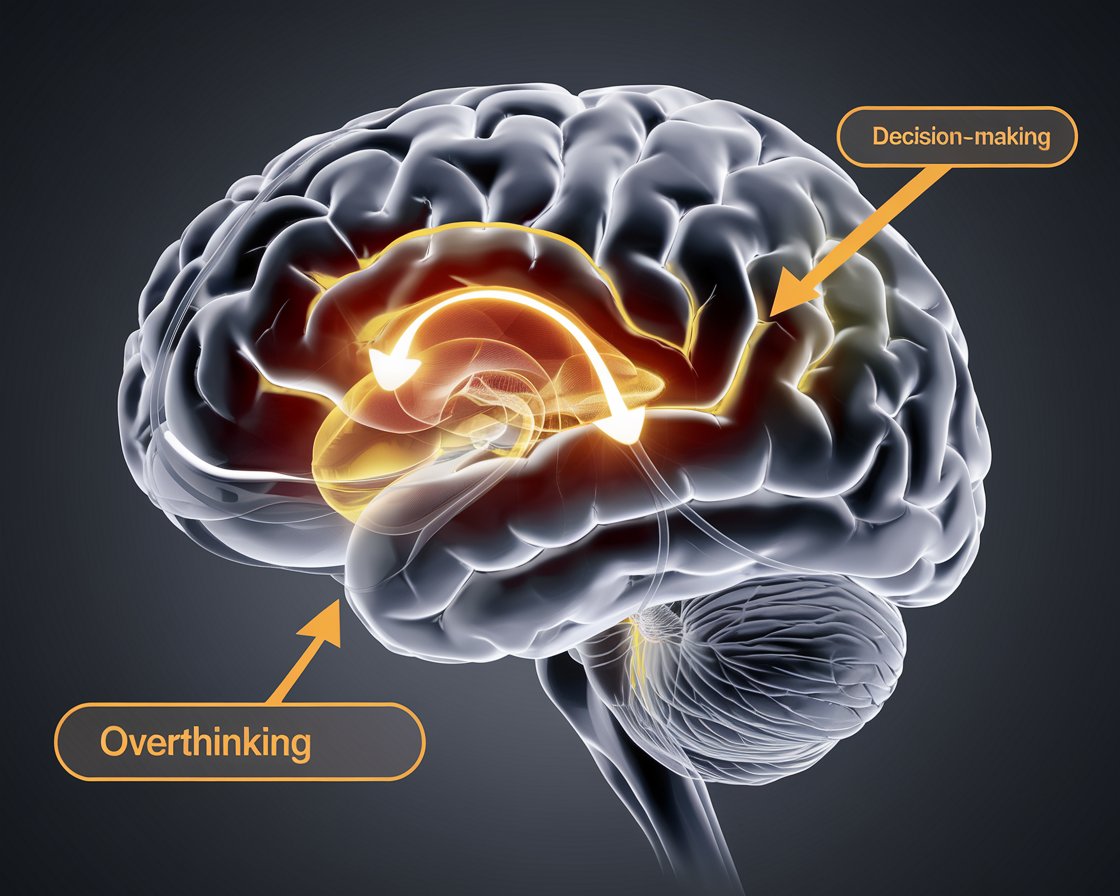Ah, overthinking—an old frenemy of ours. It’s like that one roommate who never leaves, always hanging around with unsolicited opinions, nagging questions, and a fondness for late-night existential crises. Most people will tell you to silence this pesky mental chatter, to “just stop overthinking,” as if it’s as simple as hitting the off switch on a blender. But what if I told you that overthinking isn’t the villain it’s made out to be? What if it’s actually your secret weapon, waiting to be honed, like a sword in a scabbard or a particularly verbose parrot?
You see, overthinking doesn’t have to be the cognitive equivalent of quicksand. When harnessed properly, it can be a powerful tool for self-reflection, creative problem-solving, and making well-informed decisions. It’s time to stop shunning your inner debate team and start giving them some real problems to solve.

The Not-So-Dark Side of Overthinking
Let’s begin by dispelling a myth: overthinking isn’t inherently bad. Sure, it can spiral into anxiety if left unchecked, much like letting a child loose in a candy store without supervision. But with a bit of mindfulness, you can train that overactive brain of yours to be an asset rather than a liability.
1. Overthinking as Self-Reflection
Let’s take a step back and think (because overthinkers love thinking about thinking). What exactly is overthinking? At its core, it’s an intense form of reflection. You’re turning an idea, a decision, or a memory over and over in your mind, examining it from every angle like Sherlock Holmes with a magnifying glass. Sure, sometimes this leads to analysis paralysis, where you’re so bogged down by possibilities that you can’t make a move. But when done correctly, this level of introspection can lead to profound self-awareness and personal growth.
Think of overthinking as a mental gym. You’re exercising your cognitive muscles, pushing them to new limits. Instead of dreading the mental marathons, why not view them as a chance to become more in tune with your inner workings? The key is to channel this energy constructively—journal your thoughts, discuss them with a trusted friend, or even turn them into creative expression. After all, self-reflection is a cornerstone of mindfulness and emotional intelligence.
2. Overthinking as Creative Problem-Solving
Overthinking isn’t just for brooding artists and anxious philosophers—it’s also a breeding ground for innovation. Some of the world’s greatest minds were notorious overthinkers. Albert Einstein, Steve Jobs, and even J.K. Rowling spent countless hours lost in thought, contemplating the “what-ifs” and “maybes” that most people might brush aside.
Overthinkers naturally excel at divergent thinking, a key component of creativity. By exploring multiple possibilities and considering different angles, they often stumble upon solutions that others miss. This ability to see beyond the obvious is what drives innovation. It’s why overthinkers might be the ones to come up with the next big idea, the groundbreaking concept that changes everything. So, the next time you find yourself spiraling into a vortex of ideas, don’t panic—lean into it. You never know what creative gems might emerge from that whirlpool of thought.
3. Overthinking as Better Decision-Making
It’s a common misconception that overthinking leads to indecision. While it’s true that too much pondering can slow down the decision-making process, overthinkers actually have an advantage: they consider all the variables. Unlike impulsive decision-makers, overthinkers weigh the pros and cons, evaluate potential outcomes, and anticipate obstacles. This thorough approach can result in more informed, deliberate choices.
Sure, you might take longer to decide whether to order the pizza or the salad, but when it comes to the big decisions—career moves, relationships, life-changing purchases—your careful consideration pays off. By thinking things through from every possible angle, you’re less likely to make choices you’ll regret later. Embrace your inner debate team, give each member a voice, and let them hash it out. The final verdict will likely be a well-rounded, thoroughly thought-out decision.
The Science Behind Overthinking: Why Your Brain Loves to Spiral
Overthinking isn’t just a quirky personality trait—it’s rooted in how our brains are wired. The human brain is a remarkable organ, designed to process vast amounts of information, analyze patterns, and anticipate future outcomes. In evolutionary terms, overthinking was a survival mechanism. Our ancestors who could anticipate potential dangers and plan accordingly were more likely to survive and pass on their genes.
Today, however, this ancient survival tool sometimes misfires, leading to what we now call overthinking. Instead of worrying about the lion hiding in the bushes, we’re fretting over a social media post or a tricky email. But understanding the science behind this tendency can help us manage it more effectively.
The Role of the Prefrontal Cortex
The prefrontal cortex is the part of the brain responsible for higher-order thinking—planning, decision-making, and, yes, overthinking. This region of the brain is more developed in humans than in any other species, which is why we’re capable of such complex thought processes. But this advanced cognitive ability comes at a cost: the tendency to ruminate.
When you overthink, your prefrontal cortex is working overtime, trying to predict every possible outcome of a situation. This can be exhausting, but it also means you’re thoroughly considering all your options. Rather than seeing this as a negative, recognize it as a sign of your brain’s exceptional capabilities.
Overthinking and the Fight-or-Flight Response
Overthinking is also linked to the brain’s fight-or-flight response. When faced with a perceived threat, the amygdala—another part of the brain—triggers a surge of adrenaline, preparing you to either confront the danger or run away. In modern life, these “threats” are often psychological rather than physical, such as the fear of making a wrong decision or being judged by others. As a result, your brain goes into overdrive, analyzing every possible outcome in an attempt to protect you.
Understanding this connection can help you reframe overthinking as a natural response rather than a flaw. By acknowledging that your brain is simply trying to keep you safe, you can start to manage these thought patterns more effectively.

Practical Tips to Harness the Power of Overthinking
Now that we’ve established that overthinking isn’t all bad, let’s look at some practical ways to harness this superpower. With a few adjustments, you can transform your overthinking into a force for good, turning potential pitfalls into opportunities for growth and creativity.
1. Set a Time Limit for Reflection
One of the biggest challenges with overthinking is knowing when to stop. It’s easy to get lost in a loop, going over the same thoughts again and again without reaching a conclusion. To prevent this, try setting a time limit for your reflections. Give yourself 10 minutes to think through a problem, and then make a decision or move on to something else. This can help you avoid getting stuck in an endless cycle of analysis.
2. Practice Mindfulness and Grounding Techniques
Mindfulness is a powerful tool for managing overthinking. By staying present in the moment, you can break the cycle of rumination and focus on what’s happening right now. Grounding techniques, such as deep breathing, meditation, or simply paying attention to your surroundings, can help you stay anchored in the present.
The next time you catch yourself spiraling into overthinking, pause and take a few deep breaths. Focus on the sensation of the air entering and leaving your body. Notice the sights, sounds, and smells around you. By bringing your attention back to the present, you can calm your mind and reduce the intensity of your thoughts.
3. Turn Your Thoughts Into Action
Overthinking often leads to a lot of ideas but not much action. To combat this, try turning your thoughts into something tangible. If you’re overthinking a project, for example, start by writing down your ideas. Create a plan of action or make a to-do list. By taking concrete steps, you can move from rumination to productivity.
Similarly, if you’re overthinking a personal issue, try discussing it with someone you trust. Sometimes, just getting your thoughts out of your head and into the open can provide clarity and relief. Action is the antidote to overthinking.
Harness the Awkwardness: Overthinking as a Tool for Personal Growth
Let’s face it—overthinking can lead to some awkward moments. Maybe you’ve replayed a conversation in your head a hundred times, cringing at something you said, or perhaps you’ve spent an hour agonizing over whether to send a text message. These moments might feel uncomfortable, but they’re also opportunities for growth.
Harnessing the awkwardness of overthinking means accepting yourself as you are, quirks and all. It’s about recognizing that everyone has moments of doubt and uncertainty. Rather than trying to suppress these feelings, lean into them. Use them as a chance to learn more about yourself, to understand your fears and insecurities, and to grow from them.
The next time you find yourself in an overthinking spiral, remember this: it’s okay to be a little awkward. In fact, it’s human. And in that awkwardness lies the potential for deeper self-awareness and personal development.
With this newfound perspective, go forth and embrace your inner debate team. Overthinking isn’t a flaw; it’s a feature—one that, when used correctly, can lead to greater creativity, deeper self-awareness, and more informed decision-making. So, let your thoughts run wild, but don’t forget to rein them in every now and then. After all, even the most skilled debate team needs a coach.
Takeaways:
- Overthinking can be a powerful tool for self-reflection: It allows you to explore your thoughts and emotions more deeply, leading to greater self-awareness and personal growth.
- Overthinking fosters creativity and innovation: By considering multiple possibilities and exploring different angles, overthinkers are often able to come up with unique solutions and ideas.
- Overthinking leads to better decision-making: Despite its reputation for causing indecision, overthinking allows you to carefully weigh your options and make more informed, deliberate choices.

